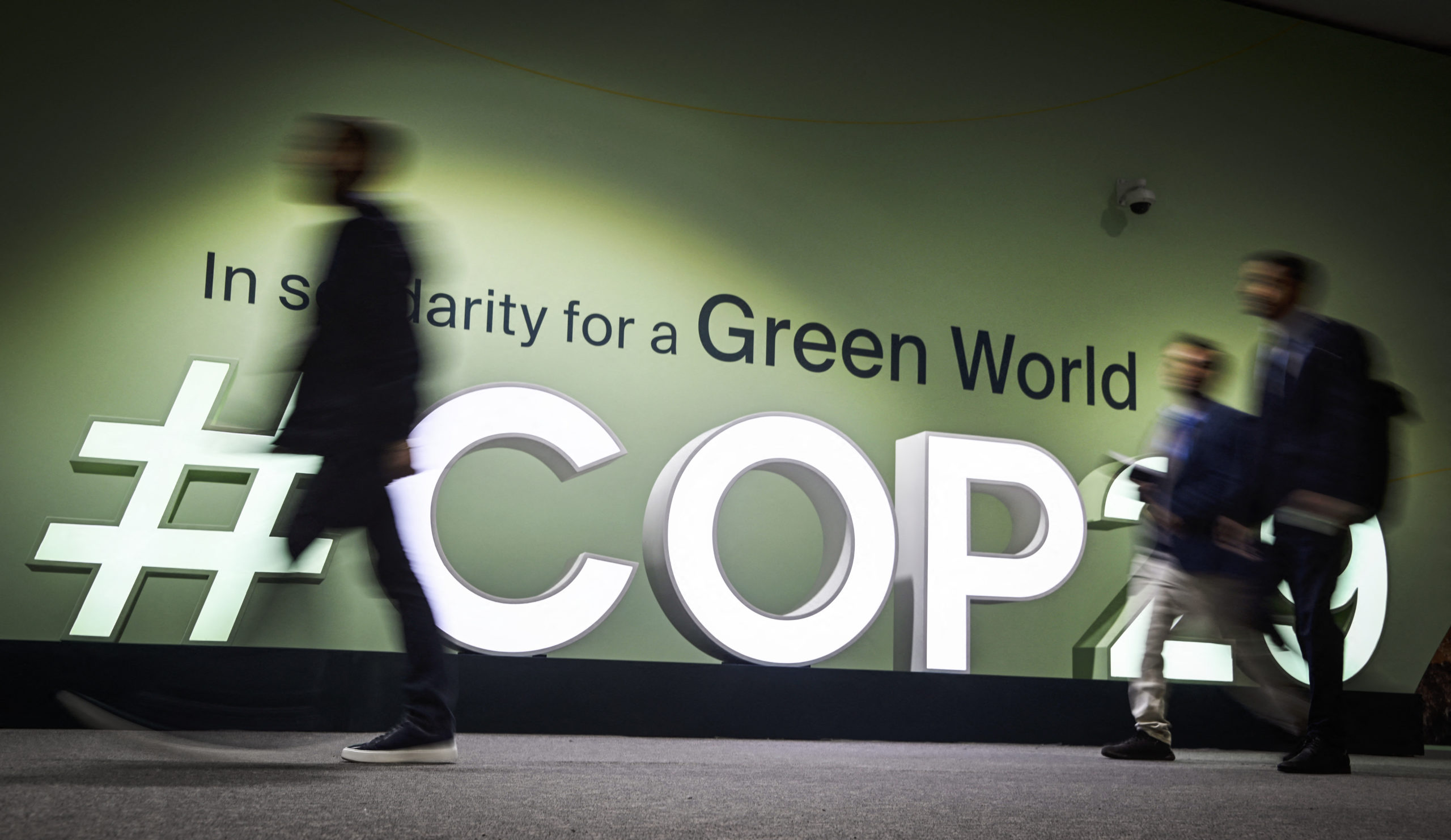Discover the main topics under discussion at COP29
Climate event in Baku discusses new targets for climate adaptation, financing, and reducing greenhouse gas emissions
 People walk past the logotype at the venue for the 2024 United Nations Climate Change Conference (COP29) in Baku on November 11, 2024. - The COP29 climate talks open on November 11 in Azerbaijan, under the long shadow cast by the re-election of Donald Trump, who has pledged to row back on the United States' carbon-cutting commitments. (Photo by Alexander NEMENOV / AFP)
People walk past the logotype at the venue for the 2024 United Nations Climate Change Conference (COP29) in Baku on November 11, 2024. - The COP29 climate talks open on November 11 in Azerbaijan, under the long shadow cast by the re-election of Donald Trump, who has pledged to row back on the United States' carbon-cutting commitments. (Photo by Alexander NEMENOV / AFP)
The 29th edition of the UN Climate Conference began on Monday (11) in Baku, the capital of Azerbaijan, and will run until November 22. The event brings together representatives from 198 countries that are signatories to the United Nations Framework Convention on Climate Change to discuss strategies for mitigation and adaptation to global warming, as well as to establish new commitments and targets for reducing greenhouse gas emissions.
The Framework Convention was set up during the “Rio-92” Earth Summit and was a milestone in climate change discussions. It has been presenting the issue as an environmental and global concern since the 1990s. Since then, the annual conference has served as a stage for both progress and setbacks in climate negotiations, with active participation from civil society, the private sector, academia, as well as business groups, scientific research organizations, trade unions, and traditional peoples.
In this edition, the main topics are climate adaptation, climate financing, and the New Collective Quantified Goal (NCQG), a key element of the Paris Agreement, aimed at mobilizing resources and setting ambitious targets to limit global temperature rise.
Read more
Countries are expected to present more ambitious targets at COP29. This urgency is driven by extreme climate events in different parts of the world, underscoring the need for change. According to a study by the World Meteorological Organization (WMO), a United Nations agency, the ten-year period from 2015 to 2024 has been the hottest on record. Conectas highlights some of the topics under discussion at COP29.
Climate Adaptation
Climate adaptation is an urgent response to the changes already affecting our planet. Extreme climate events are becoming increasingly frequent and severe, disproportionately impacting vulnerable communities, such as traditional communities and Indigenous peoples. In urban settings, it is the residents of peripheral areas who are most affected. In these regions there is a lack of public policies for infrastructure and sanitation, among other issues.
COP29 provides a platform to discuss strategies for enhancing the resilience of these communities, ensuring they have the resources needed to adapt to new climate realities. The implementation of nature-based solutions, such as ecosystem restoration, is a priority in supporting activists and entire communities who seek help from governments and international organizations to boost adaptive capacity and mitigate the adverse impacts of climate change.
Climate Finance
Climate financing remains a critical issue in international negotiations. The promise to mobilize $100 billion per year to support developing countries has been a point of contention, with much of these funds still undelivered.
At COP29, Brazil and other developing countries are expected to push for more robust and transparent commitments, demanding that the resources be provided primarily as grants rather than loans that increase debt burdens. The quality of the resources, their accessibility, and transparency are essential to ensure that nations most affected by climate change can implement effective actions.
CQG: Climate Finance within the Paris Agreement
The Paris Agreement established a framework for climate financing, but its implementation has been slow. The Collective Quantified Goal (CQG) aims to ensure that developed countries provide adequate financial resources to support both mitigation and adaptation efforts in developing countries.
During COP29, discussions are focused on how to make these commitments more effective and ensure that resources reach those who need them most, without exacerbating existing inequalities.
NCQG: New Collective Quantified Goal
The NCQG (New Collective Quantified Goal) is an evolution of the CQG, aiming to significantly increase the climate financing available to developing countries. With the estimated need around $5 trillion per year, the NCQG seeks to establish a new financing baseline that reflects the urgency and scale of the climate crisis.
COP29 will serve as a platform for intense negotiations on how to structure this new commitment, ensuring it is ambitious enough to address current and future climate challenges.
The role of Brazil
As a voice for developing countries and the future host of COP30 in Belém, Pará, Brazil plays an important role at COP29. This is an opportunity for the country to establish itself as a leader in promoting climate justice and energy transition. However, such leadership requires concrete actions, not just rhetoric.
Brazil faces significant socio-environmental challenges: illegal deforestation, environmental crimes, and legislation that eases regulations and threatens the lives and rights of Indigenous peoples and traditional communities. All of this highlights the urgency of climate justice in our country.
At COP29, Brazil must oppose destructive practices and promote policies that balance economic development, environmental protection, and social justice. It is essential to seek transparent climate financing that directly benefits affected communities.
Brazil’s participation in COP29 is an opportunity to redefine its global role as a defender of human rights and the environment.
“As human rights and environmental defenders, we advocate for a participatory COP that is attentive to urgent solutions. Together with a network of civil society partners, we are working to ensure that participating countries demonstrate ambition and commitment, guaranteeing that the decisions made in Baku lead to concrete and effective actions to protect our planet.” Said Camila Mikie, advisor for the socio-environmental rights defense program at Conectas, who is in Azerbaijan.






